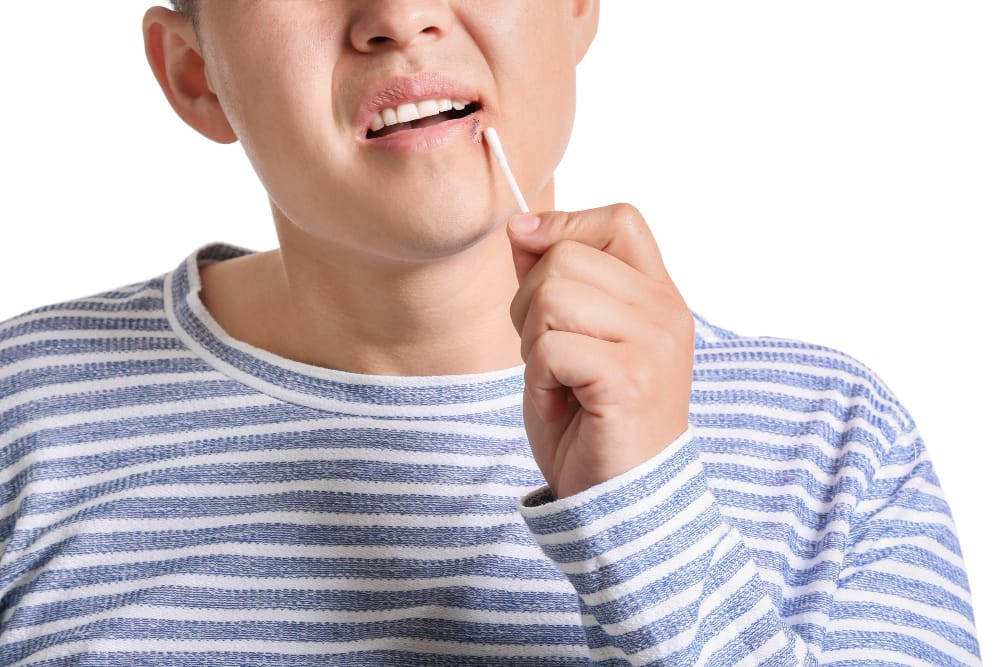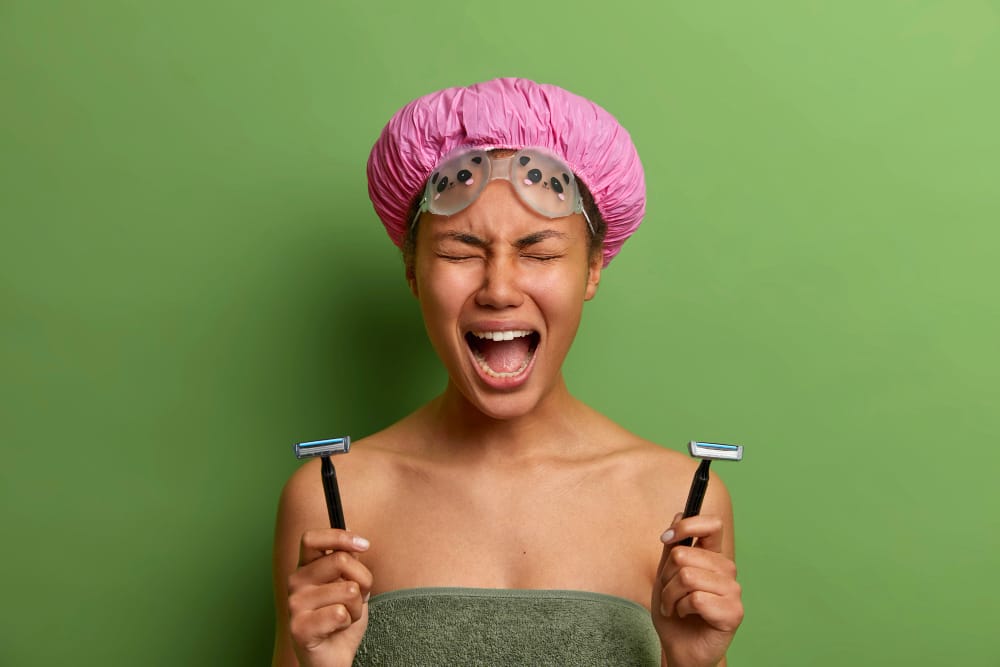Herpes virus is a stubborn virus that doesn’t leave the body but lies dormant in the body when treated with medications. Although you can’t completely get rid of this virus, there’re ways to ensure it doesn’t recur in the future. There’re things to keep in mind, such as avoiding sex or getting intimate with someone, washing your hands before and after touching sores, using condoms, and so on.
Shaving is one of the many triggers which can cause the outbreak to recur. Don’t use someone else’s used razor, which has been infected before, nor use your old razor, which you used at the time of symptoms in full swing. A treatment plan from a doctor can keep the virus dormant.
Herpes is one adamant infection that once enters your body refuses to leave quickly. It results from the herpes simplex virus (HSV) and causes cold sores and blisters to form in or around the mouth or genitals, apart from other symptoms.
Unfortunately, once you contract herpes, it forever stays in your body, sometimes dormant and other times active. But the good news is that you can manage it with medications. You need to follow some do’s and don’ts to keep it at bay.
While shaving might seem like a simple thing to remove hair, if you get a herpes outbreak whenever you shave, there’s a reason why it happens. Let’s take a look at the connection between herpes and shaving.
Herpes outbreak
There’re two types of herpes outbreaks caused by HSV:
- HSV-1 causes oral herpes, which usually affects the mouth and surrounding skin in the form of cold sores or a fever blister.
- HSV-2 causes genital herpes, which is usually sexually transmitted but has other triggers causing genital sores.
The World Health Organization stated that in 2016 3.7 billion people under the age of 50 had HSV-1. In the same year, around 491 million people ages 15 to 49 had HSV-2.
If you get herpes outbreak every time you shave, you know its symptoms include tingling, itching, or burning, then comes the blisters or sores that form around the mouth or genitals.
The signs show themselves in 2-20 days when exposed to the virus.
1. Oral herpes
Oral herpes causes blisters and cold sores to develop around the lips and mouth. Sometimes they form on other parts of the face or tongue and rarely anywhere else. They usually last for 2-3 weeks.
2. Genital herpes
These blisters or sores develop on the penis, around or inside the vagina, on the buttocks, or the anus. But they can form on other parts of the skin too.
The issue with genital herpes is that it causes pain when urinating and changes the vaginal discharge. It can last 2-6 weeks.
Shaving causing herpes
Once infected with the HSV, it’s impossible to get it out of your body.
You might be able to treat your sores and other symptoms and get them under control, but the virus goes dormant and can reappear at any time when the opportunity presents itself.
The virus can enter the body through skin abrasions or mucous membranes. Mucous membranes are the thin layers of tissue that line the openings of your body, and they can be found in your nose, mouth, and genitals.
So, once the virus enters the body, it incorporates itself into your cells. HSV tends to multiply itself and adapts to the environment very quickly, which makes treating it difficult.
When you’ve had herpes before, the initial outbreak comes with a lot of force and is severe in nature. Once controlled, the recurring outbreaks are easier to handle.
One leading cause of recurring herpes is weakened immunity or other chronic illnesses they’re suffering from.
When you’ve HSV or any other person, you’re close to having it, and it’s easier for it to spread from skin contact. That’s why it’s advisable for people with herpes to avoid sex until they’ve cured their physical symptoms of it.
Herpes can transfer from skin contact with the moist skin of the mouth and genitals, including the anus, and it also spreads from contact with other areas of the skin and the eyes.
When you’re shaving, you’ve to make sure that you’re not using someone else’s used razor as we know it’s easily transferable from person to person. Another thing to make sure of is to use a new razor if you suspect symptoms in you.
When you keep using the same razor you’ve used when you had symptoms, the chances of recurring genital herpes outbreaks increase sometimes, even ingrown pubic hair can be confused with herpes.
Ingrown hair or herpes

Razor burn is an uncomfortable skin irritation that happens after shaving causing bumps or blisters in the genital area. Sometimes the hair follicle is blocked, resulting ingrown hair confusing it with herpes.
Symptoms of genital herpes:
- A cluster of blister-like watery sores or lesions
- Bumps typically smaller than 2 millimeters
- Repeated outbreaks of these sores
- Yellow discharge if the sore ruptures
- Sores possibly tender to touch
- Headache
- Fever
The main difference between ingrown hair and genital herpes is that ingrown hair develops as isolated lesions or bumps. They don’t grow in clusters or groups.
Symptoms of ingrown hair:
- Single sores or isolated bumps
- Small, red bumps
- Bumps with a pimple-like head
- Itching
- Tenderness around the bump
- Inflammation and soreness
- White pus if the sore is squeezed or ruptures
Treating recurring herpes

Not every person who has had herpes before gets it again, but if you’re facing the issue of recurring herpes, there’s a need to focus on treating it properly for once and all.
The problem with herpes is that its virus lays dormant in your body. When you’re shaving, you also need to be careful of not making any cuts or abrasions on the skin, for that can trigger the virus to come out and cause an outbreak in the form of blisters and sores.
Make sure never to shave when you still have physical symptoms present. Only when you’ve treated yourself completely, and there’re no visible signs of herpes anymore should you shave with a new razor and never share your razor or use someone else’s used one.
Keep an eye if it’s the ingrown hair you’re confusing for herpes.
When it comes to treatment, there’re several ways to treat both oral and genital herpes:
Medications
Getting a prescription of the medications is the surest way to treat herpes infection. Although it can’t be treated completely and removed from the body, it can be controlled by antiviral medicines, such as acyclovir, to prevent the virus from multiplying.
To treat the tingling, burning, and itching, you can use over-the-counter herpes cream.
According to CDC, this initial herpes outbreak might appear in 4 days. So when you suspect symptoms, you should start treatment within 24 hours of contacting it. Using antiviral medications and cream can cure the outbreak in a couple of days.
If someone gets fewer than six recurrences of genital herpes per year, a doctor may prescribe an antiviral medication at each recurrence. But if a person experiences recurrences more frequently, the doctor might recommend taking medications for 6-12 months.
If you leave prescription medication in between, there’s a higher chance of herpes sores recurring, be it by shaving or another means.
Some home remedies include:
- Applying cornstarch on the affected area
- Squirting water from a bottle onto blisters to ease the pain while urinating
- Applying aloe vera gel to sores
- You can take pain relief medications
- Bathing in a bit salted warm water
- Using petroleum jelly on the affected area
- Wearing loose clothes
- Avoiding getting intimate or sex
- Using a cream or lotion to the urethra before urinating
Preventing herpes recurrence
There’re a couple of things you can do to prevent herpes from recurring. Though the virus won’t altogether leave your body still, you can do a few things:
- Avoid sex or sexual contact with someone when you’ve symptoms present.
- Only have sex or sexual contact when you’ve treated your symptoms, such as cold sores or blisters. Use condoms whenever having sex.
- Avoid oral sex if you’ve sores around your mouth, or it can cause genital herpes infection.
- Please wash your hands before and after touching sores and affected areas to prevent spreading them.
Different people have different triggers which can cause the virus to cause an outbreak. Just like using someone’s used razor when they have had herpes before. Or using an old razor of yours when you’ve had herpes before.
These are things that can cause skin irritation that no one tells you about but causes a lot of damage.
FAQs
Why do I keep having Herpes outbreaks?
Once you get infected with the herpes virus, it doesn’t go away from your body.
The outbreak can be controlled and muted with medications, but it remains in the body and stays dormant. Various triggers can cause the outbreaks to recur.
These include illness, stress, fatigue, sunlight, low immune system, and various others.
Shaving is one such trigger that isn’t that common but can cause the infection to go from one person to another if you use another infected person’s razor.
Can I live a normal life with herpes?
There are various antiviral medications and creams which you can use to control and subdue the symptoms of herpes once you get infected from the virus.
If you keep taking medications as prescribed by the doctor, you can live a normal life.
There are instances of herpes recurring, but that can be controlled too and are less severe than the first outbreak.
Why do I have a herpes outbreak every month?
You might have a herpes outbreak every month if you get periods.
This is one such trigger for many people who have had herpes that can cause recurrence of herpes. This time brings increased stress, fear, anxiety, or PMS, and this can increase the outbreak, again and again, every month.
If you know your triggers, it’s easier to handle the infection beforehand and start the treatment to subdue the symptoms.
Can you have two herpes outbreaks in a row?
You can have more than one outbreak of herpes, both HSV-1 and HSV-2. You can have sores near your mouth as well as in your genitals.
The only way to make sure it goes away and treat it is to take proper medications and subdue the virus.
During this time, it’s vital to limit contact as it spreads quickly when the symptoms are in full swing.
Is herpes less contagious over time?
For someone who just got herpes, the first outbreak is more severe than someone who has had it for years.
Over time, the herpes virus becomes less intense as one also learns the medications and ways to reduce the outbreaks and keep the virus in its dormant state.
To summarise
There’re no sure ways to treat the herpes virus completely, and you can only try to prevent further outbreaks by following a couple of things and treating it using medications on time. There’re many triggers to herpes, and shaving could be one of them.
When you want to shave, you’ve to make sure of a couple of things. Only then can you prevent it from recurring. It remains in the dormant state unless triggered by various other factors.
Just take care of such triggers and follow your doctor’s treatment plans to prevent further outbreaks.


